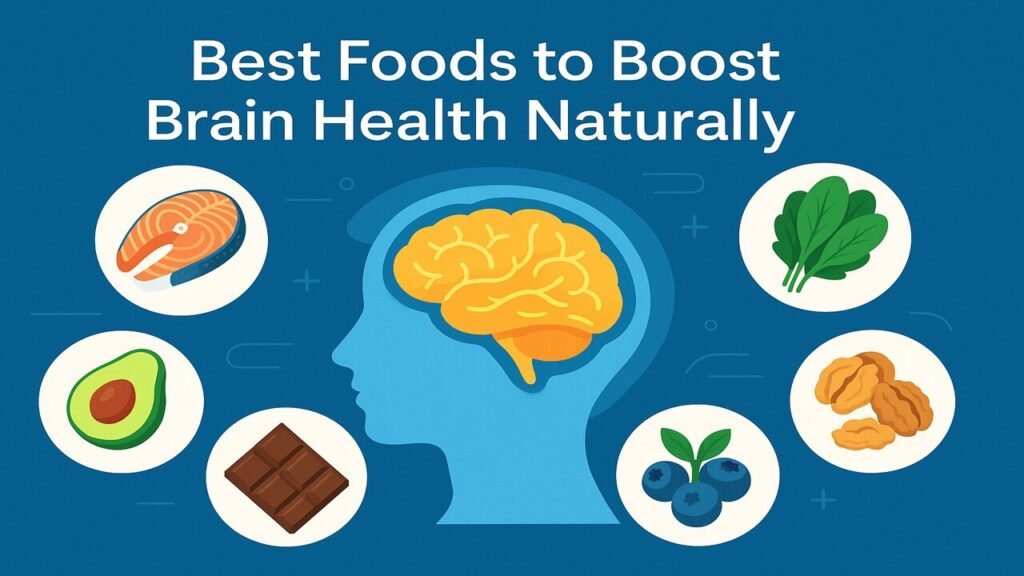We often hear the phrase “you are what you eat,” and when it comes to brain health, this couldn’t be more accurate. The food we put on our plate doesn’t just fuel the body; it directly influences memory, focus, and mental performance. From a child preparing for school exams to an adult working long office hours to an older person looking to maintain sharpness in later years, brain health is important at every stage of life.
While the brain makes up only two percent of body weight, it consumes about twenty percent of the body’s energy. This means the foods we eat play a critical role in supporting its functions. A diet rich in whole, nutrient-dense foods can help improve concentration, boost learning capacity, stabilize mood, and even protect against age-related decline. In this article, we’ll explore the best foods that naturally enhance brain health, why they matter, and how you can make them part of your daily routine.
Why Diet is Linked to Brain Function
Every action we take—whether solving a problem, recalling a memory, or managing emotions—depends on how efficiently brain cells communicate with each other. These processes rely on nutrients that serve as building blocks for neurotransmitters, protect brain tissue, and ensure proper blood flow.
Healthy fats such as omega-3s strengthen the structure of brain cell membranes. Antioxidants protect neurons from oxidative stress, which can otherwise lead to memory loss and cognitive decline. Vitamins and minerals act as co-factors in brain chemistry, ensuring messages travel smoothly between cells. Without the right nutrition, these processes slow down, leading to poor concentration and early signs of mental fatigue.
Fatty Fish
Fish such as salmon, mackerel, sardines, and tuna are among the best natural sources of omega-3 fatty acids. These fats are essential because the body cannot produce them on its own. Almost half of the brain’s fat is made up of omega-3s, making them critical for building and repairing brain cells.
Studies show that people who eat fish regularly tend to have more gray matter in the brain—the area responsible for memory and decision-making. Regular consumption of fatty fish is also linked to lower rates of depression and age-related decline.
How to add to your diet: Grilled salmon twice a week, sardines on whole grain crackers, or tuna in a fresh salad are all excellent choices.
Berries
Blueberries, strawberries, and raspberries are not only delicious but also powerful allies for the brain. Their rich color comes from compounds called anthocyanins, which are strong antioxidants. These compounds reduce inflammation, improve communication between brain cells, and protect against memory loss.
Long-term studies suggest that regular consumption of berries can delay brain aging by several years. They also support blood flow to the brain, which enhances focus and processing speed.
How to add to your diet: Mix blueberries into oatmeal, enjoy strawberries with yogurt, or use raspberries in smoothies for a natural, nutrient-rich sweetener.
Nuts and Seeds
Nuts such as walnuts, almonds, and hazelnuts, along with seeds like flaxseeds, chia seeds, and pumpkin seeds, are nutrient-dense snacks that support cognitive health. Walnuts are especially beneficial because they contain high levels of DHA, a type of omega-3 fat crucial for brain development and function.
These foods are also rich in vitamin E, a nutrient that protects brain cells from oxidative damage and slows down the effects of aging. Magnesium, zinc, and iron found in seeds further enhance learning ability, memory retention, and mood regulation.
How to add to your diet: A handful of walnuts or almonds makes for an easy snack. Sprinkle flaxseeds over cereals or yogurt, or blend chia seeds into smoothies.
Dark Chocolate
Good news for chocolate lovers: dark chocolate with at least 70 percent cocoa contains flavonoids, caffeine, and antioxidants that are beneficial for brain health. Flavonoids in particular help improve memory and stimulate blood flow to the brain.
Moderate consumption of dark chocolate can also enhance mood by triggering the release of endorphins. Studies suggest it may even lower the risk of cognitive decline with age.
How to add to your diet: Replace sugary milk chocolate with a small square of high-quality dark chocolate a few times a week.
Leafy Green Vegetables
Vegetables such as spinach, kale, collard greens, and broccoli are rich in vitamins and antioxidants that help preserve brain health. Vitamin K, lutein, and folate play a direct role in maintaining cognitive sharpness.
In long-term studies, people who consumed one serving of leafy greens daily had brains that performed as though they were years younger compared to those who rarely ate them. These vegetables also fight oxidative stress and protect neurons from damage.
How to add to your diet: Add spinach to smoothies, prepare kale salads, or steam broccoli as a simple side dish.
Coffee and Green Tea
Coffee and tea are both powerful stimulants for the brain when consumed in moderation. Caffeine blocks adenosine, a chemical that causes drowsiness, helping you stay alert and focused. Coffee is also known to boost dopamine and serotonin, neurotransmitters linked to mood.
Green tea provides an additional benefit through L-theanine, an amino acid that promotes relaxation while enhancing concentration. Together, caffeine and L-theanine create a balanced effect—keeping the brain focused without overstimulation.
How to add to your diet: A morning coffee can improve energy, while green tea during the day supports focus and calmness.
Eggs
Eggs are an affordable and nutrient-packed food that supports brain function. They are rich in choline, a nutrient necessary for producing acetylcholine, which plays a key role in learning and memory.
Eggs also provide B vitamins, including B6, B12, and folate, which help regulate homocysteine levels. High levels of homocysteine have been linked to dementia and poor brain performance.
How to add to your diet: Eat boiled eggs as a snack, prepare vegetable omelets, or include eggs in healthy stir-fries.
Whole Grains
The brain needs a steady supply of energy, and whole grains such as oats, brown rice, and quinoa are excellent sources. Unlike refined grains, whole grains release energy slowly, helping to maintain concentration throughout the day.
They are also rich in fiber, which stabilizes blood sugar levels, and vitamin B, which plays an important role in supporting mental performance.
How to add to your diet: Replace white bread with whole-grain bread, choose oatmeal for breakfast, and use quinoa in grain bowls or salads.
Avocados
Avocados are full of monounsaturated fats that promote healthy blood flow, which is essential for brain performance. They also contain potassium, vitamin K, and folate, which support brain cell function and protect against cognitive decline.
Despite being high in calories, avocados are nutrient-dense and provide long-lasting energy without spikes in blood sugar.
How to add to your diet: Spread mashed avocado on toast, slice it into salads, or blend it into smoothies.
Turmeric
Turmeric has been used in traditional medicine for centuries, and modern science has confirmed its brain benefits. Its active compound, curcumin, can cross the blood-brain barrier and directly affect brain cells.
Curcumin has been shown to enhance memory, stimulate the production of new neurons, and reduce symptoms of depression. Its anti-inflammatory and antioxidant properties also make it protective against neurodegenerative diseases.
How to add to your diet: Use turmeric in curries and soups or prepare golden milk with warm milk and turmeric.
Foods to Limit for Better Brain Health
Not all foods support brain health. Sugary drinks, processed snacks, and refined carbs provide quick energy but cause crashes that impair focus. Trans fats in fried and packaged foods damage neurons, while excessive alcohol reduces brain volume and disrupts memory. Reducing these foods helps maintain long-term brain health.
Lifestyle Tips to Support Brain Nutrition
Nutrition is only part of the equation. To maximize brain function, pair your diet with healthy lifestyle habits:
- Stay hydrated throughout the day.
- Exercise regularly to improve circulation and stimulate new brain cell growth.
- Get seven to nine hours of quality sleep to allow memory consolidation.
- Practice stress management techniques such as meditation or journaling.
- Challenge your mind with puzzles, reading, or learning new skills.
Conclusion
The brain is the most valuable organ we have, and taking care of it begins with the choices we make every day. A diet that includes fatty fish, berries, nuts, leafy greens, eggs, whole grains, avocados, turmeric, and other nutrient-dense foods can keep your memory sharp, your focus strong, and your mind healthier for longer.
It’s not about a single meal or a short-term diet but about long-term, consistent habits. By nourishing your brain naturally, you not only improve mental performance today but also build protection against age-related decline in the future.





